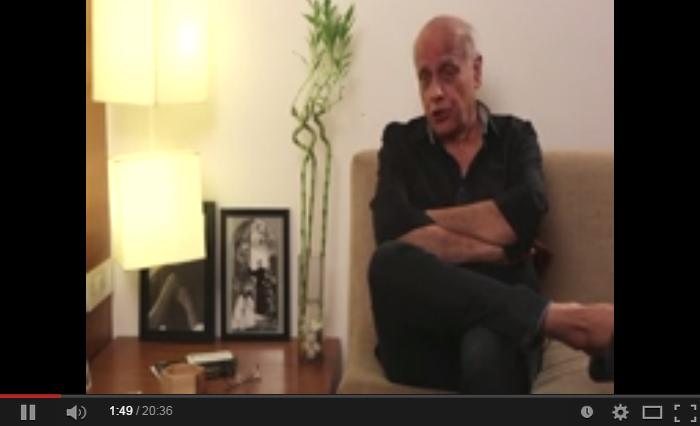Bitter on RSS' Love Jihad campaign, top director Mahesh Bhatt regrets lack of secular ethos in Bollywood
 |
| Click on the image to watch the interview on Youtube |
Top Bollywood director Mahesh Bhatt has said that the bandwidth of Indian tradition has been open and wide enough to have a Buddha 2500 years back, questioning the very basis of the Hindu system, which is based on caste system. “The RSS is seeking to narrow this tradition to a bitter and narrow perspective of faith, denying India its diversity and pluralism, which has been its uniqueness and strength”, he has pointed out in an interview with Teesta Setalvad for Communalism Combat and Hillele TV.
“Can there be development without democracy? Can there be progress without freedom?” veteran Mahesh Bhatt asks the younger generation, which, he believes, has “chosen profit over values to catapult an extreme rightwing government to power, a gover1nment whose ideology militates against the founding fathers who wrote our Constitution.”
“Nations that become intolerant, totalitarian or majoritarian run the risk of becoming sterile, where culture is dead and fear walks tall, likening this attempt in India to ape some West Asian countries, where aspirations centre around huge structures, flyovers and bridges while human beings are made and forced to turn against one another in private”, Bhatt says.
Criticising RSS’ Love Jihad in this context, Bhatt recalls his last directorial venture, “Zakhm”, which is based against the backdrop of the 1992-93 riots in Mumbai. Saying that it depicted his “personal anguish”, he recalls how actor Ajay Devgun, portraying Bhatt in the film declared, “Ma aur mulk badle nahin jaa sakte” (mother and the country cannot be changed).
The boy “determinedly tries to bury his dead mother, Shirin Mohammed Ali, while mobs shouting chilling slogans of “Shuddikaran and rashtra ki safai” (purification and cleaning up the nation – familiar sounds today) which prevent his free passage to the Shia burial ground. “Daddy aapse isliye shaadi nahin kar saken na kyonki aap Mussalmaan hai? Kya Hindu Musalmaanse nahin shaadi kar sakta?” (daddy couldn’t marry you only because you are a Muslim isn’t it? Cant Hindus and Muslims marry?), wonders the young actor tearfully clinging to his mother.
“These lines sit well16 years later when the hate cries of Love Jehad are the new methods of bloodletting and moral policing”, Bhatt says, recalling how under a restrictive BJP-led NDA-I regime in early 2000s he was compelled to “digitally change scenes that depicted the mobs on Mumbai’s streets wearing saffron headbands and also dilute a scene that showed the rank communalisation within the police force.
“Those scenes for me were straight from the ugly mobs atop the Babri Masjid”, says Bhatt who recounts how for every film maker, writer and dissenter, the personal is the political, adding, “My mother suffered deeply because of this intolerant Nagar Brahmin stream to which my father belonged”.
“The trauma of Partition could be dealt with and a minority made to feel safe within India largely due to a man like Jawaharlal Nehru – India’s first Prime Minister - whose consciousness was shaped by Mahatma Gandhi and who could be seen chasing a murderous mob with a cane at Delhi’s Connaught place when it tried to burn a Muslim shop”, Bhatt says.
“The efforts of the current regime in Delhi to denigrate Nehru are cheap bids to snatch away the narrative from political opponents by altering the historical narrative. The inability of the leadership of ‘secular’ parties to confront the fanatics and fundamentalists within and outside their ranks has resulted in the abysmal state of affairs today”, he believes.
Speaking about the current-day Bollywood and Hindi cinema, Bhatt says, “until the advent of the neo-liberal phase of the Indian political economy, it was wedded to the values of Indian nation building where plurality had to be preserved and diversity celebrated.” But now, ‘profit at any cost’ ideology of neo-liberal economics has “tried to flush this fundamental concern out though it has not succeeded completely.”
Bhatt recalls how Dilip Kumar a la Yusuf Khan “in the roles he has played and the values he represents embodies these values though he has suffered from the fanatical rightwing tendencies that have attacked him… Many of his roles for which he received praise and acclaim were those he played a Hindu, singing bhajans and celebrating this vast land. Yet the “Hai Ram” he uttered at the climax of the film, ‘Ganga Jumna’ generated heat and dust with vile requests for its ‘cuts’ until the veteran actor put his foot down.”
Bhatt also spoke in the interview about his successful efforts to breach the Indo-Pak divide through joint productions even though hate mongerers have dubbed him an ‘ISI agent’ for these productions. “How do you deal with the hatred? You have to take it on your chin and always remember that it is a price you have to pay for being you! Even the Mahatma was the targeting of bitter hatred”, says Bhatt.

Comments